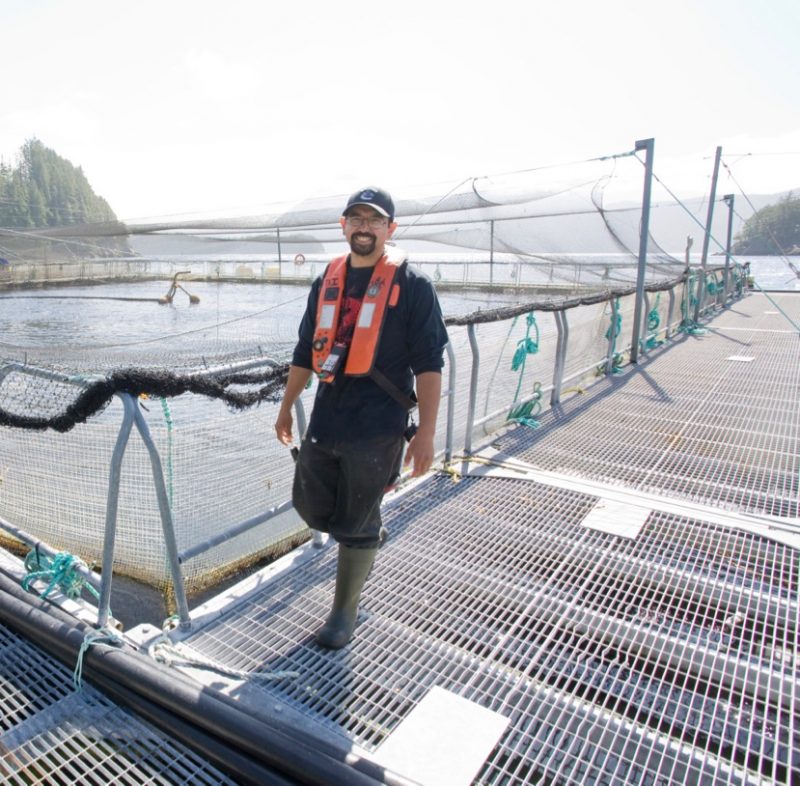A livelihood threatened by well-funded “bullying”
By Maurice Isaac
Maurice Isaac (pictured) is a member of the Tlowitsis First Nation, and lives in Alert Bay. He is site manager at Midsummer salmon farm.
I am on my 24th year working in the aquaculture industry: six years at a salmon enhancement facility (Gwani hatchery), and now 18 years working as a salmon farmer. Salmon farming has always been my source of income, it has helped me raise my family and without it I would probably be on welfare due to lack of work here in the community of Alert Bay. I have turned it into a great career that I love, support, and take great pride in. But recent activities by some people around my workplace — who don’t appreciate my career like I do — have been picked up in media headlines, and I find myself wanting to speak up for those, who like me, have chosen aquaculture as a career but don’t often get a voice in the headlines.
As business projects in British Columbia are developed or reviewed, First Nation people can choose how they wish to participate in this process. Will it be through a consultative process, through the courts, or by direct action and intimidation?
I am a First Nation person working as a manager at a salmon farm near my home town of Alert Bay. During my 18 years working on a salmon farm, I have seen all three options exercised against my worksite, all with very different degrees of success.
In Canada, the Government (“Crown”) has a duty to consult with First Nation governments, and if Indigenous rights may be infringed upon, there may be accommodation granted. This consultation process must be thorough and consider local values, community benefits, environmental risks, and most importantly, must be about facts.
Through meaningful consultation, I have seen neighbouring bands and individuals learn about, and accept the risks and benefits from participating in salmon aquaculture. Some communities have relied on salmon farming as their main economic driver for over 20 years.
If, after consultation is concluded, the First Nation wants to appeal the Crown’s decision, they can launch a legal challenge.
When the Kwicksutaineuk/Ah-Kwa-Mish First Nation did not feel they were properly consulted with when the Canadian government renewed finfish aquaculture licenses located in their shared territory, they started a judicial review.
They lost.
In 2012, the Supreme Court concluded that the Crown’s consultation with the Kwicksutaineuk/Ah-Kwa-Mish First Nation was “extensive, open-minded, and genuine”.
The third option, intimidation, has personally affected me lately. I also call it harassment and bullying.
In British Columbia, we have all read about well-funded activist groups that team up with some First Nations to increase media attention about their cause, with hopes of pressuring governments to make decisions based on perceived “public interest”. Site C and Kinder Morgan are obvious examples, but there are many more acts of intimidation currently happening around B.C.
My farm site, located near Alert Bay, has recently been the focus of protesters. Individuals were a mix of a First Nation family, Sea Shepherd Society members, and some unnamed non-Indigenous people from Vancouver and California. Some of them camped overnight on my salmon farm for several months, blocked my staff from accessing parts of their worksite, and harassed all of us daily, in person and on social media.
We were very concerned for our safety, the protester’s safety, and our rights as a property owner.
We were also concerned that the RCMP would not intervene to protect employees working at a licensed and permitted workplace. So we had to apply to B.C.’s Supreme Court for an injunction against the protesters. Justice Peter Voith granted the injunction on Dec. 22, 2017. The decision acknowledged the “antagonistic and threatening” behaviour of protesters, and concluded that “persons cannot unilaterally engage in various forms of unlawful conduct with the object of interfering”.
He also noted that our company had made repeated offers to meet with concerned First Nations governments to discuss specific concerns and issues, but that every such attempt had been dismissed.
With our injunction in hand, protesters immediately left our workplace.
I was glad to see that intimidation didn’t work. It shouldn’t work in a democratic country that has a constitutional obligation to consult with First Nations about important activities happening in their traditional territory. Our federal and provincial governments shouldn’t be bullied into making critical decisions for our Province by special interest groups that have chosen to ignore the rights of lawful businesses and working persons, and who have no interest in dialogue.
My grandfather taught me to be respectful of people with different opinions, to listen to them, and to politely express your own perspective. I believe we have a process in Canada — consultation and accommodation — that echoes my grandfather’s lesson. I hope that First Nation leadership chooses this constitutional right as the way to responsibly represent their membership.
Maurice Isaac is a member of the Tlowitsis First Nation, and lives in Alert Bay. He is site manager at Midsummer salmon farm.

